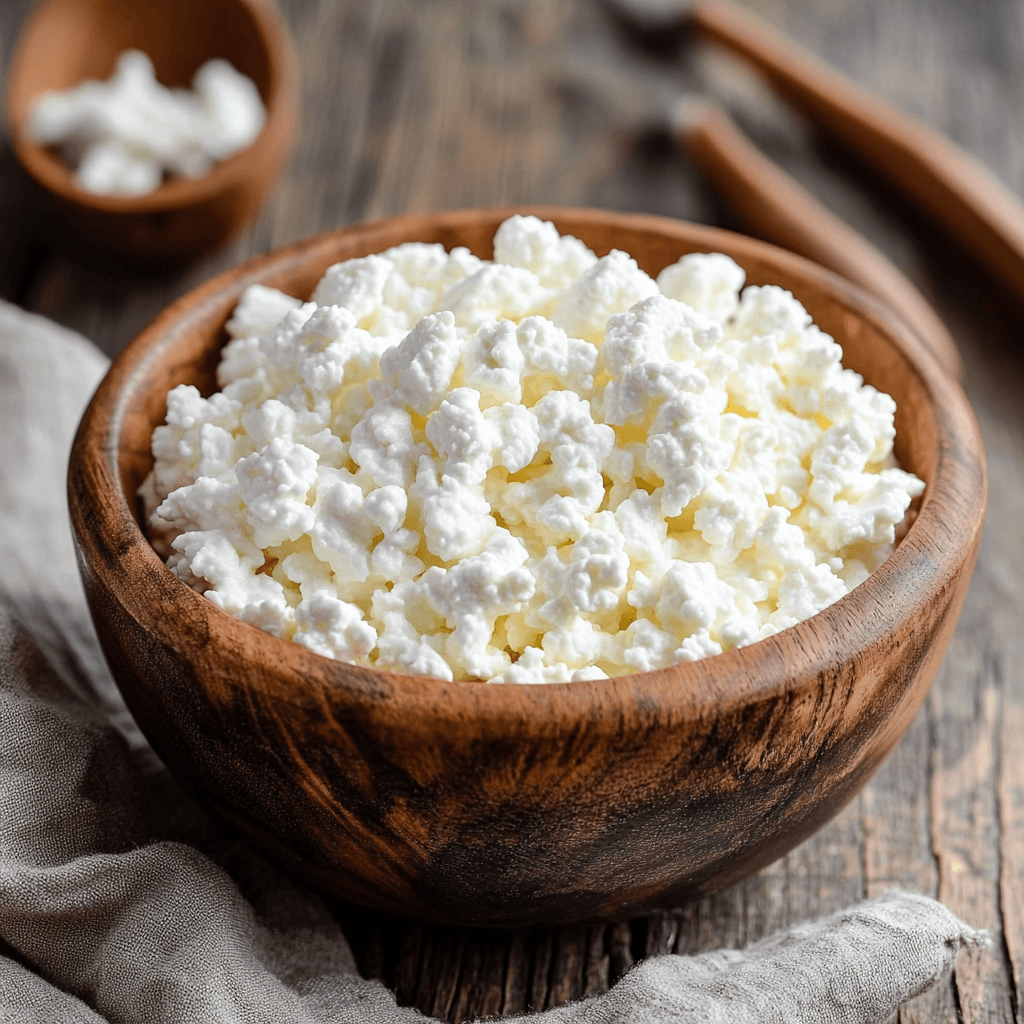Is cottage cheese healthy or fattening?
Is cottage cheese healthy or fattening? Cottage cheese is often touted as a nutritious and versatile food, loved for its high protein content and low-calorie profile. But as with many foods that gain popularity, there’s a debate about whether cottage cheese is truly healthy or if it could be considered fattening. This article takes a deep dive into the nutritional benefits, potential downsides, and various ways to incorporate cottage cheese into your diet, helping you make an informed decision on whether this dairy product deserves a place on your plate.
What is Cottage Cheese?
Cottage cheese is a fresh cheese known for its mild flavor and slightly lumpy texture. It is made from the curds of pasteurized cow’s milk, which are drained but not pressed, allowing some whey to remain. This process gives cottage cheese its characteristic texture and moisture content. Cottage cheese comes in various fat content levels, including non-fat, low-fat, and full-fat versions. Some versions are also flavored or mixed with fruits, making it a versatile ingredient in both sweet and savory dishes. Is cottage cheese healthy or fattening?
Types of Cottage Cheese
There are several types of cottage cheese available, which can vary based on fat content, curd size, and flavor additives:
- Non-Fat Cottage Cheese: Made from skim milk, this version has the lowest fat content, making it a popular choice for those on a calorie-restricted diet.
- Low-Fat Cottage Cheese: Made from reduced-fat milk, this version offers a balance between creaminess and lower fat content.
- Full-Fat Cottage Cheese: Made from whole milk, this variety has a richer flavor and creamier texture but also contains more fat.
- Flavored Cottage Cheese: Often mixed with fruits or sweeteners, these versions can contain added sugars or artificial flavors, so it’s important to read the labels.
Nutritional Profile of Cottage Cheese
Cottage cheese is widely regarded as a healthy food, primarily due to its nutritional profile. A standard serving size of one cup (approximately 225 grams) of low-fat cottage cheese provides:
- Around 185 calories
- About 25 grams of high-quality protein
- 2.7 grams of total fat (of which 1.4 grams are saturated fats)
- 6.2 grams of carbohydrates
- Approximately 70 milligrams of calcium (about 7% of the Daily Value)
- 303 milligrams of sodium (about 13% of the Daily Value)
- Good amounts of phosphorus, selenium, vitamin B12, and riboflavin
This composition makes cottage cheese a popular choice for those following low-carb, high-protein diets like keto or Atkins. Its high protein content is particularly beneficial for muscle repair and growth, making it a favorite among athletes and fitness enthusiasts.
Is cottage cheese healthy or fattening? According to the Cleveland Clinic, cottage cheese is one of the healthiest cheeses available, thanks to its low-calorie and high-protein content. However, it’s also important to consider the sodium levels, which can vary significantly between different brands and types of cottage cheese. The Harvard School of Public Health advises consumers to check sodium levels, especially if they have hypertension or are on a sodium-restricted diet.
Health Benefits of Cottage Cheese
Cottage cheese offers numerous health benefits due to its nutrient-dense profile. Let’s explore some of the key benefits in more detail:
1. High Protein Content
Cottage cheese is an excellent source of high-quality protein. With about 25 grams of protein per cup, it provides all the essential amino acids your body needs. This high protein content makes it a great choice for:
- Muscle Growth and Repair: Protein is essential for muscle recovery and growth, making cottage cheese an ideal snack for athletes and bodybuilders.
- Weight Management: High-protein foods like cottage cheese can help increase satiety, meaning you feel fuller for longer, which can aid in weight loss and prevent overeating.
2. Rich in Calcium
Calcium is crucial for maintaining strong bones and teeth, and cottage cheese provides a good source of this vital mineral. Regular consumption of calcium-rich foods can help prevent osteoporosis, particularly in post-menopausal women who are at higher risk of bone density loss.
3. Contains B Vitamins and Selenium
Cottage cheese is rich in B vitamins, including B12 and riboflavin, which are important for energy production and the proper functioning of the nervous system. Additionally, it contains selenium, a powerful antioxidant that helps protect cells from oxidative damage and supports immune function.
4. Low in Calories
For those aiming to lose weight, cottage cheese is a fantastic option due to its low-calorie count. It provides a feeling of fullness without the added calories, making it an excellent food choice for calorie-controlled diets.
5. Supports Digestive Health
Some versions of cottage cheese contain probiotics, beneficial bacteria that support gut health. Probiotics can aid digestion, enhance immune function, and reduce symptoms of certain gastrointestinal disorders.
Potential Downsides of Cottage Cheese
Despite its many benefits, cottage cheese isn’t without its potential downsides. Here are some factors to consider:
1. High Sodium Content
Many commercial brands of cottage cheese are high in sodium, which can be a concern for those with high blood pressure or those trying to reduce their salt intake. High sodium intake can lead to water retention and increase the risk of hypertension, heart disease, and stroke. When choosing cottage cheese, it’s crucial to read labels and opt for low-sodium versions whenever possible.
2. Saturated Fat in Full-Fat Versions
Full-fat cottage cheese can be more satisfying and may offer additional nutrients, but it also contains more saturated fat. While some research suggests that not all saturated fats are equally harmful, consuming too much can still increase the risk of heart disease and high cholesterol levels, especially in individuals who are genetically predisposed.
3. Lactose Intolerance
Cottage cheese is a dairy product, meaning it contains lactose. For individuals who are lactose intolerant, consuming cottage cheese can lead to digestive discomfort, including bloating, gas, and diarrhea. However, some lactose-intolerant individuals can tolerate small amounts, especially if they choose low-lactose or lactose-free versions.
4. Additives in Flavored Varieties
Flavored cottage cheeses may contain added sugars, artificial flavors, and preservatives, which can diminish the health benefits of this otherwise nutritious food. It’s best to opt for plain varieties and add fresh fruits, vegetables, or spices to enhance flavor naturally.
Cottage Cheese in Popular Diets
Cottage cheese is a versatile ingredient that fits well into various diets:
1. Keto Diet
Cottage cheese’s low carbohydrate content makes it an excellent option for those following a keto diet. It can be combined with other high-fat, low-carb foods such as avocados, nuts, or seeds to create a balanced, keto-friendly meal.
2. Low-Calorie and Weight Loss Diets
Due to its high protein and low-calorie profile, cottage cheese is a suitable choice for weight loss. It helps keep you full longer, reducing the likelihood of overeating and making it easier to stick to a calorie deficit.
3. High-Protein Diets
For those on high-protein diets, such as bodybuilders or athletes, cottage cheese offers a substantial amount of easily digestible protein. This can support muscle recovery and growth, making it an ideal food for post-workout meals or snacks.
4. Low-Carb Diets
Cottage cheese is also a great option for those following low-carb diets. Its minimal carbohydrate content allows it to fit well into a meal plan focused on reducing carb intake while still providing essential nutrients.
For more ideas on how to include cottage cheese in various diets, check out these cottage cheese recipes that offer creative and healthy ways to enjoy this versatile ingredient.
Is Cottage Cheese Fattening?
Is cottage cheese healthy or fattening? Whether cottage cheese is considered fattening largely depends on the type consumed and the portion size. Generally, cottage cheese is relatively low in calories and fat, particularly if you choose the low-fat or non-fat versions. However, if you consume large quantities, especially of the full-fat variety, it could contribute to an increased caloric intake, potentially leading to weight gain.
Factors That Could Make Cottage Cheese Fattening
- Portion Size: Eating large portions of cottage cheese, particularly the full-fat kind, can add up in calories and fat, potentially leading to weight gain.
- Additives: Flavored versions often contain added sugars and artificial ingredients, which can increase calorie content and reduce nutritional value.
- Pairings: Combining cottage cheese with high-calorie foods like sugary fruits, crackers, or dressings can also contribute to excess calorie consumption.
In contrast, when consumed in moderation as part of a balanced diet, cottage cheese can support weight management. Its high protein content helps keep you full, reducing the temptation to snack on less healthy foods.
How to Incorporate Cottage Cheese into Your Diet
Cottage cheese is a versatile food that can be enjoyed in various ways, both sweet and savory. Here are some ideas on how to incorporate cottage cheese into your diet:
Breakfast Ideas
- Cottage Cheese with Fresh Fruit: Combine cottage cheese with berries, pineapple, or banana slices for a protein-packed breakfast.
- Smoothie Addition: Blend cottage cheese into your morning smoothie to add creaminess and boost protein content.
- On Toast: Spread cottage cheese on whole-grain toast and top with avocado slices, tomatoes, or a sprinkle of chia seeds for added fiber.
Lunch and Dinner Ideas
- Salad Topping: Add a dollop of cottage cheese to salads for extra protein and creaminess. It pairs well with greens, tomatoes, cucumbers, and grilled chicken.
- Stuffed Peppers: Use cottage cheese as a filling for stuffed bell peppers, combining it with quinoa, spinach, and spices for a healthy, high-protein dish.
- Pasta Substitute: Mix cottage cheese with cooked vegetables like zucchini or spinach to create a low-carb, high-protein alternative to traditional pasta dishes.
Snack and Dessert Ideas
- Veggie Dip: Mix cottage cheese with herbs and spices to create a healthy dip for raw vegetables.
- Cottage Cheese Parfait: Layer cottage cheese with granola, honey, and fresh fruit to create a nutritious dessert or snack.
- Cottage Cheese Pancakes: Use cottage cheese as a base ingredient in pancakes for a protein-rich twist on a classic breakfast favorite.
For more inspiration on how to enjoy cottage cheese, see these ideas on what you can do with cottage cheese.
Cottage Cheese Recipes and Cooking Tips
Cottage cheese can be used in various recipes, from breakfast to dinner and even dessert. Here are some popular ways to use cottage cheese in your cooking:
- Cheesecakes and Desserts: Cottage cheese can be used as a lower-fat alternative to cream cheese in cheesecake recipes. It adds a rich texture and protein boost without the added fat.
- Smoothies and Shakes: Cottage cheese can be blended into smoothies and protein shakes to add a creamy texture and increase protein content.
- Savory Dishes: Cottage cheese can be used in savory dishes like lasagna, casseroles, and stuffed pasta shells, adding moisture, flavor, and nutritional value.
For detailed recipes and cooking tips, explore these cottage cheese recipes that are easy to make and delicious.
FAQs: Common Questions About Cottage Cheese
- Is cottage cheese good for weight loss?
Yes, due to its high protein and low-calorie content, cottage cheese can be an excellent addition to a weight loss diet. It helps keep you full longer, reducing the likelihood of overeating. - Can I eat cottage cheese every day?
Eating cottage cheese daily can be part of a healthy diet, especially if you choose low-sodium, low-fat options. However, it’s essential to balance your diet with other protein sources and nutrients. - Is cottage cheese better than yogurt?
Both cottage cheese and yogurt have their benefits. Cottage cheese is higher in protein, while yogurt often contains probiotics that are beneficial for gut health. The choice between the two depends on your dietary needs and preferences. - How does cottage cheese affect cholesterol levels?
Full-fat versions of cottage cheese can affect cholesterol levels due to their saturated fat content. Choosing low-fat versions can help mitigate this risk. - What is the most popular way to eat cottage cheese?
The most popular ways to eat cottage cheese include pairing it with fruits, using it as a topping for salads, or blending it into smoothies. For more popular ways to enjoy cottage cheese, see the most popular ways to eat cottage cheese.
Conclusion
Is cottage cheese healthy or fattening? Cottage cheese is a highly nutritious food that can be a healthy addition to most diets. Its high protein content, low-calorie count, and versatility make it an excellent option for those looking to increase their protein intake or manage their weight. However, it’s crucial to choose the right type of cottage cheese and consume it in moderation, especially if you have dietary restrictions or health conditions like hypertension or lactose intolerance.
Whether you’re following a low-carb, high-protein, or weight loss diet, cottage cheese can fit seamlessly into your meal plans, providing both nutrition and flavor. With its numerous health benefits and versatile uses, cottage cheese is certainly worth considering for a balanced, healthy diet.







